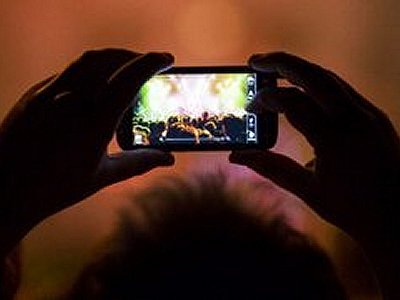
THROUGH A GLASS STARKLY
Images of traumatic incidents caught on mobile phone can be put to remarkable effect. They can also be filmed as a way of avoiding a personal response to the incident.
Among the countless biblical phrases which have clung to our conversation, ‘walking on by on the other side of the road’ is widely understood. It is taken from the parable of the Good Samaritan, where the priest and the Levite, confronted with an injured man, choose to ignore him by doing just that. Their decision to walk on the other side of the road is telling. While some have taken this to mean they were trying to avoid ritual uncleanness as the prostrate man might be dead, there is a sense in which they needed to create some distance, however spurious, in order to justify walking passed him.
Their moral imperative was clear: to care for the man as best they could. Our interpretation of this has become hesitant and ambiguous in the modern world. Sometimes this is because we cannot predict the outcome will be good. One friend of mine went to the rescue of a woman being beaten by her partner in the street one night, only for both of them to turn on him for intervening. Increasingly, the response people make to trauma is to choose to record the images on their phones rather than to pitch in and help. The shocking murder of a solider in South-East London and its aftermath was carried out in full view of many people. Two brave and dignified women went to offer what they could to the man and to confront his murderers; several others, it seems, chose to film the scene.
Shortly afterwards, an assault was carried out on a famous chef by her rich husband. Nobody thought to intervene, but the images were caught on camera for everyone to see later. The failure to protect her in a busy restaurant may also have had something to do with the aura and sycophantic boundaries surrounding celebrities, but it also underlined a developing stance over wrongdoing in public. The leader of the Liberal Democrats was criticised for failing to say he would have acted decisively to help, had he been present, but the truth is that few of us know how we would respond in any situation until faced with the moment of crisis, to our shame.
Images caught on mobile phones can be put to remarkable effect. Police abuses during the Arab spring in countries like Egypt have been exposed by the opportune onlooker, suggestive of a new and flexible approach to citizen journalism which is able to expose wrongdoing; the physical embodiment of shedding spiritual light on places of darkness. What alterations to history might have been made in the twentieth century had this facility been available? The growing abuse of Jewish people in Europe and the terrors of Stalinism were not readily believed or understood by others until it was too late. It may be naïve to think much would have changed, but the power of one image alone can be transformative, as the picture of a starving Ethiopian girl in 1984 shows, among several which could be named. The incident referred to earlier has led to a renewed and vigorous debate on the alarming incidence in violence towards women; cruelty which crosses class boundaries.
There should be, nevertheless, some unease surrounding the instinctive resort to filming incidents where the first need of the victim is help and comfort. Placing a mobile phone between your face and the trauma unfolding has the feel of walking by on the other side of the road, of creating some distance between subject and object in order to excuse inaction. It is unlikely Jesus would have commended someone for filming the injured traveller in the parable and distributing it later to warn pilgrims of the perils of the road between Jericho and Jerusalem. The immediate need was to help the victim. Not everyone filming a scene is in a position to help, but it should be the first question we ask of ourselves when the crisis erupts.
POPULAR ARTICLES

Obama's Covert Wars
The use of drones is going to change warfare out of all recognition in the next decades.

Through A Glass Starkly
Images of traumatic incidents caught on mobile phone can be put to remarkable effect.

What Are British Values?
Is there a British identity and if so, what has shaped the values and institutions that form it?


